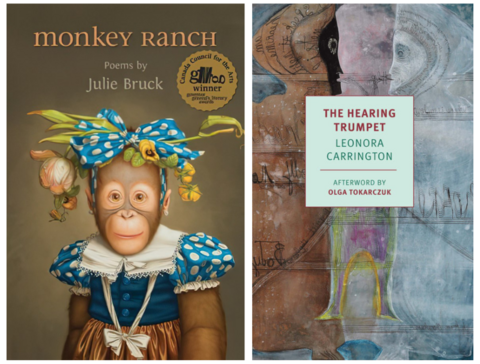
In 2010, a bunch of friends started an impossible book club, impossible as none of us—a wool-shop owner, an editor, a prof, a psychiatrist, a psychologist, a community program head, a Crown prosecutor, most parents or about to be—had time to read. Our meeting rule, more or less kept up: the book had to be published before 1960. We still meet, so one of two books I’m alight with currently—it’s always the ones on the bedside table that you want to wave about in the day and shout ‘Read This!” —is from that group: The Hearing Trumpet, an unexpectedly funny novel by surrealist painter Leonora Carrington. She became part of their scene in the 1930s after a magically weird childhood in Crookhey Hall, fleeing class expectations to Paris and Spain, fleeing fascism and the arrest of lover Max Ernst by the Nazis, living most of the rest of her life with passionate ambivalence in Mexico, painting and writing and raising kids (startling to think she was alive as recently as 2011). The Hearing Trumpet is written a bit past her halfway point and still has the searing, fearless, blunt urgency of that prewar epoch. Astringent tonic.
The other book is Monkey Ranch, which seems by contrast a kind of gentle contemporary surrealism, quieter and wise and precise—your arm gets a little pleasant numbing wipe before the needle goes in—alight with the small strangenesses noticed only by Julie Bruck, who keeps flying under the radar with her perfect poetry collections. A lot of involuntary sharp inhalations on a poem’s finish—that kind of truth.
Clare Goulet is a Québécoise-British hybrid living in Nova Scotia; she’s published creative nonfiction, poetry, and reviews as well as essays on metaphor and polyphony. She co-edited with Mark Dickinson Lyric Ecology on the work of Jan Zwicky. Graphis scripta: writing lichen will be published by Gaspereau in spring 2024
Read Clare Goulet's poetry in Issue 296 (Summer Poetry 2023)










